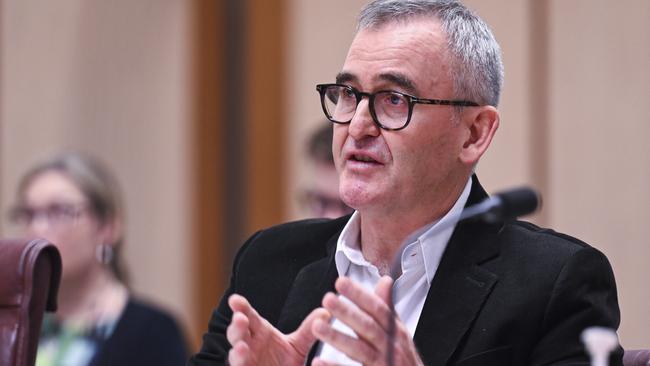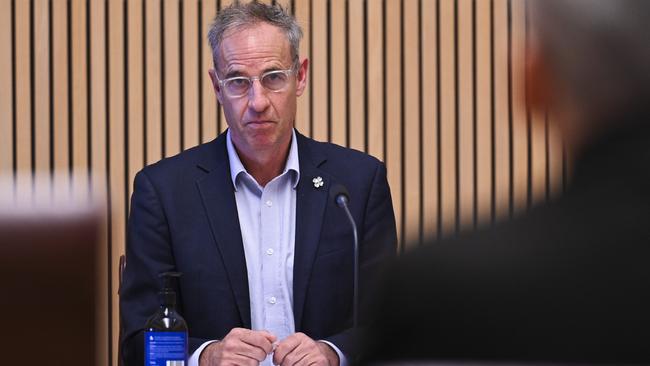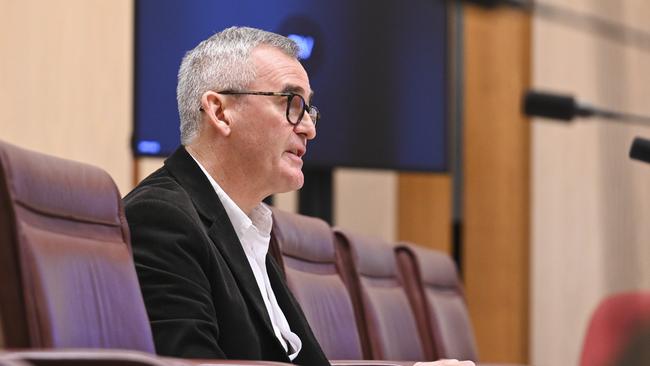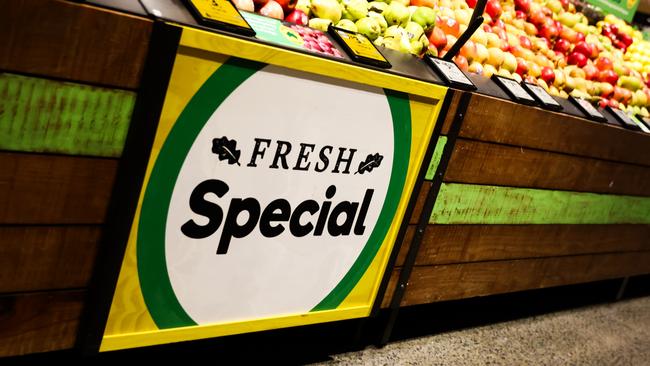Woolies boss Brad Banducci cops Bullsh*t and jail threats: Canberra are we really doing this?


Indeed, Greens Senator Nick McKim – the chair of the inquiry into supermarket prices – has undermined the importance of his own probe, threatening Banducci with jail time over his response on how returns are generated by Woolworths.
McKim, who briefly worked in advertising before entering politics two decades ago, wasn’t getting his way. He blustered, threw a tantrum and accused the Woolies boss of “bullshit” and lying. Then as chair, the Tasmanian Green levelled repeated threats of personal sanctions and jail time for contempt of Senate rules. Canberra, are we really doing this?
This was never intended to be an exercise in information gathering by the Greens senator. And with other senators sitting idly by, if this reflects the attitude of politicians toward business and private capital, Australia is fast moving toward an economically destructive place.
If this is the benchmark, why would any other CEO volunteer co-operating with the myriad of parliamentary inquiries that are already chewing up an extraordinary amount of time?

The Greens-led push to get the Senate look at supermarket pricing was always going to be a politically motivated exercise. This was evident in the very loaded “price gouging” preamble by McKim. There’s a bigger motivation for McKim, the Greens are gunning hard for a forced break-up of the supermarkets.
“You have thrived in a weak regulatory environment, you’ve engaged in anti-competitive behaviour and you’ve convinced large parts of this parliament, not to rein you in,” the Greens senator said in his welcome to both CEOs.
It is a shallow political response to deep and very real consumer frustration about inflation. But performances like McKim’s simply let Australians down.
The Albanese government, vulnerable over cost of living pressures, decided to back the Greens push for a supermarkets inquiry earlier this year. This means Labor are also responsible for this farce. And by doing so they’ve essentially outsourced Albanese’s efforts to respond to the crisis to the Greens.
To really get to the bottom of pricing pressures any inquiry should also consider the regulatory, planning and supply chain challenges faced by the supermarkets. Add into this rents, energy costs, and labour pressures that are all adding substantially to their cost of doing business. Then there are demands from Woolworths’ own local suppliers to raise prices. All of these points will merely form a footnote in the final report.
Instead the inquiry, like so many efforts in performative politics these days, has been conflated with a dozen concurrent real and invented issues supermarkets are grappling with. This includes the code of conduct with suppliers as well as competition barriers when it comes to expansion and adjacent acquisitions. There are problems in securing cash and the lack of resilience in the supply chain. Of course there is the yet-to-be-proved claims of gouging by the big supermarkets by McKim has the answer.
All smoke, no gun
The senator reckoned he cracked the code by ignoring all conventional measures of earnings used by Woolworths and Coles as well as their investors for that matter, to instead target both supermarkets fulsome return on equity number.
This was not the focus of Woolworths, Banducci repeated. Nor was it a number that executives were remunerated on, or even how big investors measured the supermarkets performance, Banducci told the committee. Woolworths’ best measure was ROFE: return on funds employed.
Last year, Woolworths return on equity was 26.8 per cent. Australian banks are closer to 10 per cent. Voila – there’s the price gouging smoking gun, McKim blustered, ignoring that Commonwealth Bank generated 14 per cent.
Big banks have a lower return on equity than Woolworths or Coles. We all know big banks are gouging, McKim reasoned. So that means the supermarkets must be twice as bad.
What he can’t understand is banks are required to put aside large levels of capital to back their lending and this lowers their returns. ROE is more generally used as a like-for-like earnings measure among banks given they are very capital hungry and constantly topping up their balance sheet with new funds. For non-bank players ROE measures vary greatly and are less meaningful. Woolworths doesn’t have a need to keep topping up its capital base – nor does rival Coles.

Woolies’ ROE numbers put it behind BHP which has a return of equity in the low 30s. The retailer is closer to CSL, Cochlear and Rio Tinto with a return on equity measure in the 20s. By way of comparison A2 Milk has an ROE in high teens. Coles delivered 31 per cent last year. Don’t tell McKim, JB Hi-Fi, a TV and computer discounter, had an ROE closer to 40 per cent – four times the average generate by banks.
Coles chief executive Leah Weckert appeared shortly after Banducci and explained: “There are multiple different measures that can be looked at for returns for a company and ROE is one...I would say that it’s not a measure that we use a lot in the grocery space”.
In other words, McKim’s smoking gun was just smoke.
Senator, what a wasted opportunity to try an understand and fix the challenges faced by business and consumers in this high-inflation environment.

Even with the multiple threats of being hauled off to jail for six months, Banducci held firm.
“I have been authentic and clear in answering the question that has reassessed profitability in our sector as return on investment and total shareholder returns. Those are the numbers. We look at those numbers for our remuneration system and that’s where our focus is”.
“Return on equity actually does vary as you would be aware by month or depending on where share prices are, and I don’t focus on that,” he told the inquiry.
“The focus is – you put $1 and what is returned to you. When you look at it that way, you see us making a fair return. It’s a 10 per cent return of funds employed after tax, and you see us making a fair return in the context of the stock market, the 10 per cent total shareholder return over five years, which is the average of the ASX top 100 over that period”.
Banducci, sans tie, appeared by himself at the Senate inquiry in Canberra by himself, a risky move for a long and hostile hearing given he had to do all the talking. Throwing to a colleague would have allowed him a chance to reset. In contrast Coles’ Weckert was accompanied by government relations manager Vicki Bon.
In dealing with the senators, the Coles executives subtly put into practice conflict de-escalation training they have been giving front line staff to deal with the rise in hostile customers. In Canberra, it has come to that after all.
Banducci is planning to retire this year and by going solo he was protecting his executives including incoming Woolworths boss Amanda Bardwell from the Senate circus. This might just be Banducci’s last public act as CEO before his exit in September: taking the political bulls**t for the team.
Amazon attack
One slither of information that did escape from hours of interrogation was how competition is viewed from the vantage of the two CEOs.
As well as the direct entry of natural supermarket rivals including Aldi and Costco, both Coles and Woolies bosses spoke of tech giant Amazon as real force, particularly for packaged household goods. Significantly, Coles’ Weckert said Amazon played a role in resetting customer expectations around delivery times.

“With Amazon coming into the market and offering same day and in some cases delivery within a couple of hours we have definitely seen increased demand for what we would call immediacy where a customer is able to put in an order and get it within 60 or 90 minutes”.
Even so, Amazon’s $6bn in sales were dismissed by the senators because the tech major “doesn’t operate a supermarket here”. For context these sales are equivalent to two-thirds the supermarket turnover of national player, the IGA’s wholesaler Metcash.
Banducci also spoke at length about the rising force of Chemist Warehouse which turns over $8bn annually. Then there are others like hardware giant Bunnings moving into pet care and Wesfarmers-owned Priceline into personal care. Both bosses said competition from these areas, Aldi, IGA independents and specialist suburban retailers remained intense.
And this shows how competition is evolving in Australia and the real need for the big players to be price competitive.
“It is critical in the fight to win our customers shopping basket, which we need to do on a daily and weekly basis,” Banducci said.
“Australian consumers are savvy and have high expectations. The vast majority of consumers shop across multiple retailers. The growth of online shopping and new digital tools are making it ever easier for consumers to compare prices and cross-shop”.
All this doesn’t mean consumers are finding it any easy to make ends meet, Banducci acknowledged. But the way to beat the food inflation is by allowing retailers to invest to become even more efficient while getting goods around the country cheaper. Not that the Senate wanted to hear this.
johnstone@theaustralian.com.au



Outgoing Woolworths boss Brad Banducci was never going to be in for an easy ride in front of the Senate inquiry, but it entered a parallel universe when a Greens senator with no real substantive experience outside of politics, lectured and bullied the seasoned retail executive about how to measure profit in his business.